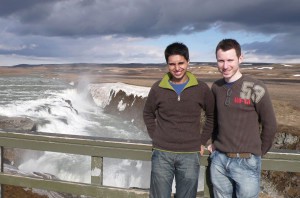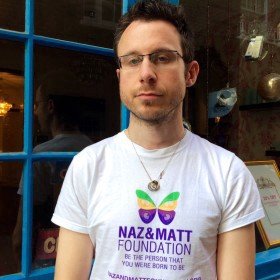Coping with grief by changing the world

Matthew Ogston met Nazim Mahmood in 2001 in Birmingham — the UK’s second-largest city. Matthew was 24, Nazim was 21. A few years later, they moved to London together. They were together for 13 years until Nazim took his own life, falling from the balcony of the flat that they shared.
Two days before his death, Nazim had finally revealed his sexuality (and his relationship with Matthew) to his conservative Muslim family.
In the weeks following Nazim’s death, Matthew established the Naz & Matt Foundation — a charity that aims to raise awareness of the impact of homophobia, with a particular focus on homophobia within a religious context.
Approaching the first anniversary of Nazim’s death, I met Matthew in the Soho neighbourhood of London — outside the cosmetic procedures clinic that Naz had established.
Wearing a t-shirt bearing the logo of his charity, Matthew looked tired, on edge.
‘I’m sorry, I’ve just had some very bad news…’ he explained, his voice shaking. He had been told that his cousin had died unexpectedly, clearly bringing back to the surface the grief and sense of loss that he seems to be constantly struggling to contain.
We walked to a nearby coffee shop, finding a quiet corner to talk.
Perhaps contributing to his tiredness, Matthew had recently completed a sponsored walk from London to Birmingham.
‘A few days after Naz passed away, all of our friends and my family were coming around to see how I was, to look after me. I just wanted to escape, to get some fresh air. I walked aimlessly through the city because I didn’t want to face coming back home. It seemed right to mark the date of Naz’s birthday with some kind of walk. I set a target of £500 but the walk raised over £11,000, with donations coming in from all over the world.’
The eight-day walk covering 150 miles seems to have been a cathartic experience for Matthew — walking from their adopted city of London (where they lived together) to their home city of Birmingham (where Nazim is buried).
While we talk it’s clear that Matthew’s emotions are always close to the surface, however this apparent fragility masks an internal strength and intense determination to honour the memory of Nazim.
The objectives of the charity are to raise awareness and to educate people about the impact of homophobia, and it seems as if the work of the charity is gaining momentum. Matthew is regularly invited to speak with students at schools in the UK, and is working on a children’s book.
Support is also coming from organisations such as The Association of British Muslims; prominent Muslim drag queen Asifa Lahore; as well as Matthew’s close friends such as Louise Port who insisted on joining him on his walk to Birmingham:
‘You don’t think that you’re going to be walking on your own, do you?’ she apparently declared. Tears began rolling down Matthew’s cheeks as he recounted the story.
There is a growing awareness in the UK regarding the difficulties faced by gay people within the Muslim community. Support group Imaan meets monthly in London, but there remains an enormous cultural pressure on people from the Muslim faith to get married and conform to religious and family expectations.
At the moment, the work of the Naz & Matt Foundation relies on the continued energy and focus of Matthew, but he knows that he has to find a different approach if the foundation is to be a sustainable force for change. Matthew is looking for ways to increase the organisational infrastructure of the charity so that he can take its messages of love and tolerance beyond the UK.
‘We get so many emails from people needing support or just wanting someone to talk to…’ he explains, ‘People unable to be themselves, worried about how their families will react. It breaks my heart.’
While Matthew’s work to establish the foundation and to tackle religion-based homophobia is extraordinary, I asked him whether tying the work of the foundation so specifically to his relationship with Nazim might have an impact on future relationships that he may have.
‘You can only have one soulmate…’ responded Matthew immediately. ‘I am still madly and deeply in love with Naz. It’s not possible to think of someone else, I have no desire to. Do I feel alone? Knowing that your soulmate is looking down on you, sending you messages, I’m not alone. Do I wish that he was physically here? Of course, but he’s not.’
Much of Matthew’s strength and resilience comes from an unshakeable belief that he is indeed being consciously guided by Nazim. ‘His voice has been coming into my head…’ confirmed Matthew, ‘…telling me to open the minds of the younger generation. I feel like I’m channelling him.’
There is a manic edge to Matthew’s grief, his loss is still obviously very raw, he is living with the intensity of it in every moment.
‘Waking up every day is a reminder that he’s not there…’ explained Matthew. ‘That’s why I don’t want to go to sleep each night, because waking up is so difficult.’
‘I feel at peace when I am home in the flat, because Naz’s energy is everywhere there, but I can’t stand the journey of going home — it reminds me too much of the day that he died.’
‘In a way, the foundation is a distraction from life, from the pain that I’m feeling. When I’m alone I cry a lot. I scream and I shout. I have to constantly find an escape from the grief. I want to use my pain, to create something positive from it. I don’t want anyone else to have to feel what I’m feeling.’
‘This is my new path. This is my mission. This is my journey. You have to celebrate what life is.’

You must be the change you wish to see in the world.
- Mahatma Gandhi
Sin kills! Sorry for your friend